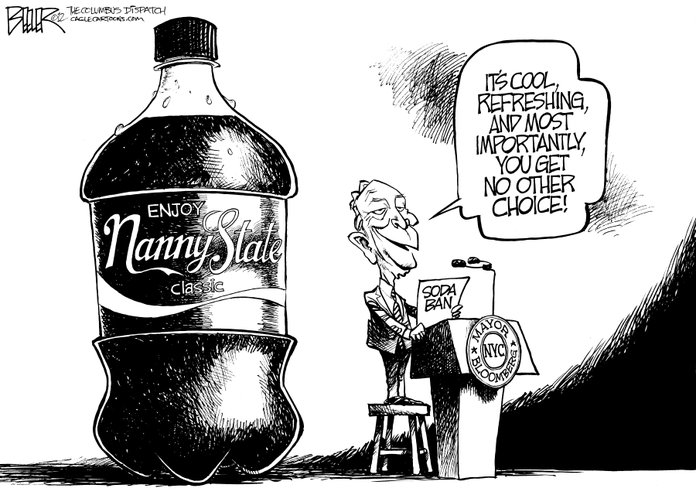Originally posted at Fox & Hounds Daily.
By John Wildermuth.
It’s one thing to tell people they should eat their vegetables, but it’s quite another to ban everything but carrots and broccoli from the dinner table.
But for many of state’s lawmakers, making rules about what Californians can and can’t eat is just part of their job description, convinced as they are that politicians know what’s best for us.
In San Francisco, the city is gearing up for a soda pop war on next year’s ballot, with Supervisor Scott Weiner calling for a two-cents-per-ounce tax on all sugary drinks. San Francisco being San Francisco, about the only complaint now being heard is from another supervisor who has his own plan for a soda tax and different ideas about how the estimated $31million in annual revenues should be spent.
If this sounds familiar, it should. A year ago, Richmond tried to put a penny-an-ounce tax on soda, only to see the ballot measure go down by a two-to-one margin, thanks to voters whose outrage was fueled by more than $2 million in campaign contributions from the American Beverage Association.
A similar measure in El Monte was walloped in a June vote.
And don’t forget that San Francisco and Santa Clara County also have banned McDonalds from putting toys in any Happy Meals that contain more than the limits they set on calories and salt.
In each case, lawmakers argued that they were just doing what was needed to stem the rising tide of childhood obesity, forgetting – or perhaps ignoring – the fact that children have parents whose job it is, morally and legally, to see to their well being.
Unless the politicians are planning to send every parent with an overweight kid to the slammer for child abuse, maybe they should back off and let those parents decide whether their child can munch the occasional French fry or, gasp, drink a Coke.
But nobody runs for office because he’s happy with the way things are. By definition, politicians have their own vision of how their communities can be improved and a conviction that their way is always the best way.
Where does it stop, though? In recent years, schools across the state have banned soft drinks and unhealthy snacks from on-campus vending machines and worked to add more fruit, vegetables, salads and healthy choices to cafeteria menus, all good things.
But kids, and especially high-school-age kids, don’t necessarily do healthy and schools watched them stream from campus and head to nearby stores and lunch trucks for food more to their taste, hold the kale.
The answer? San Francisco and other cities in the state banned food trucks from parking near school campuses, forcing kids to eat the cafeteria food or go hungry.
Never mind that there are plenty of high school seniors who are 18 years old and legally adults. In the minds of the government-knows-best crowd, it isn’t enough to educate young people to make healthy choices. You also must force them to make those choices you want by using the tools that government provides.
If you’re talking obesity, soda isn’t the only culprit. Just about any food, taken to excess, can pack on the pounds. So do you ban – or tax – bread, pasta, cookies and ice cream? Red meat has been linked to heart disease, so should that be added to the government’s “Don’t Eat This” list? Do we have to rewrite “Take Me Out to the Ballgame” to remove the peanuts and Cracker Jacks? Should the state set regulations for portion sizes and empower the plate police?
That doesn’t mean the government shouldn’t have a role in encouraging healthy eating. Forcing fast-food restaurants to put calorie counts by their menu items gives customers valuable information they can use to make their food choices. And even though genetically modified organisms, or GMOs, have been certified safe by the FDA, putting that information on food packaging would allow consumers to make their own decisions about whether they want to eat what’s inside.
In those cases, the government would require that information be provided and then step back and let people decide what to do with it.
Sure, people are going to make bad decisions. Every day people drink too much, eat the wrong foods, stay up too late and don’t floss after every meal, despite what they tell their dentist.
There’s a narrow line between education and coercion. But the fact that there is that line is the reason we have a free society.
* * *
John Wildermuth is a longtime writer on California politics.





